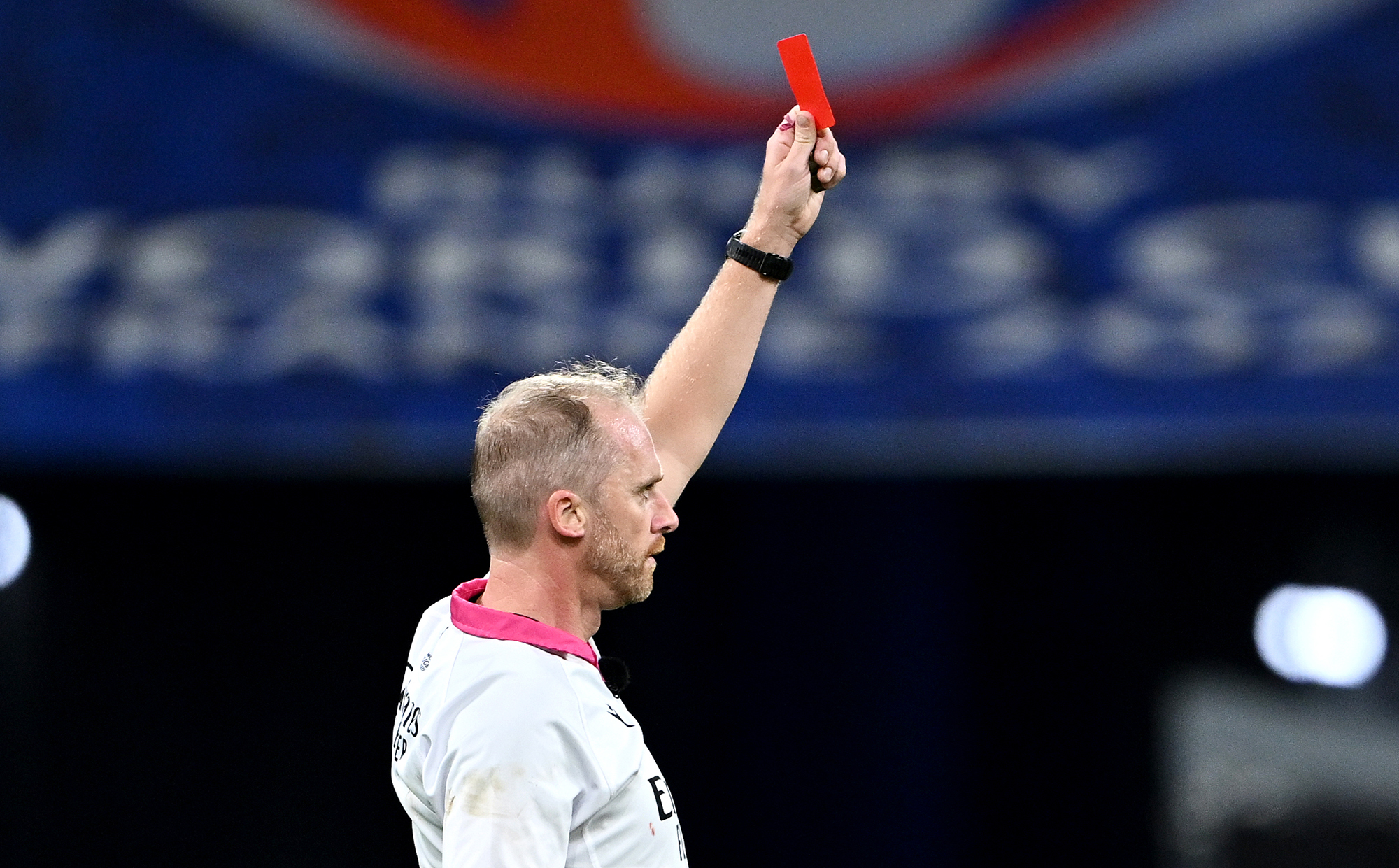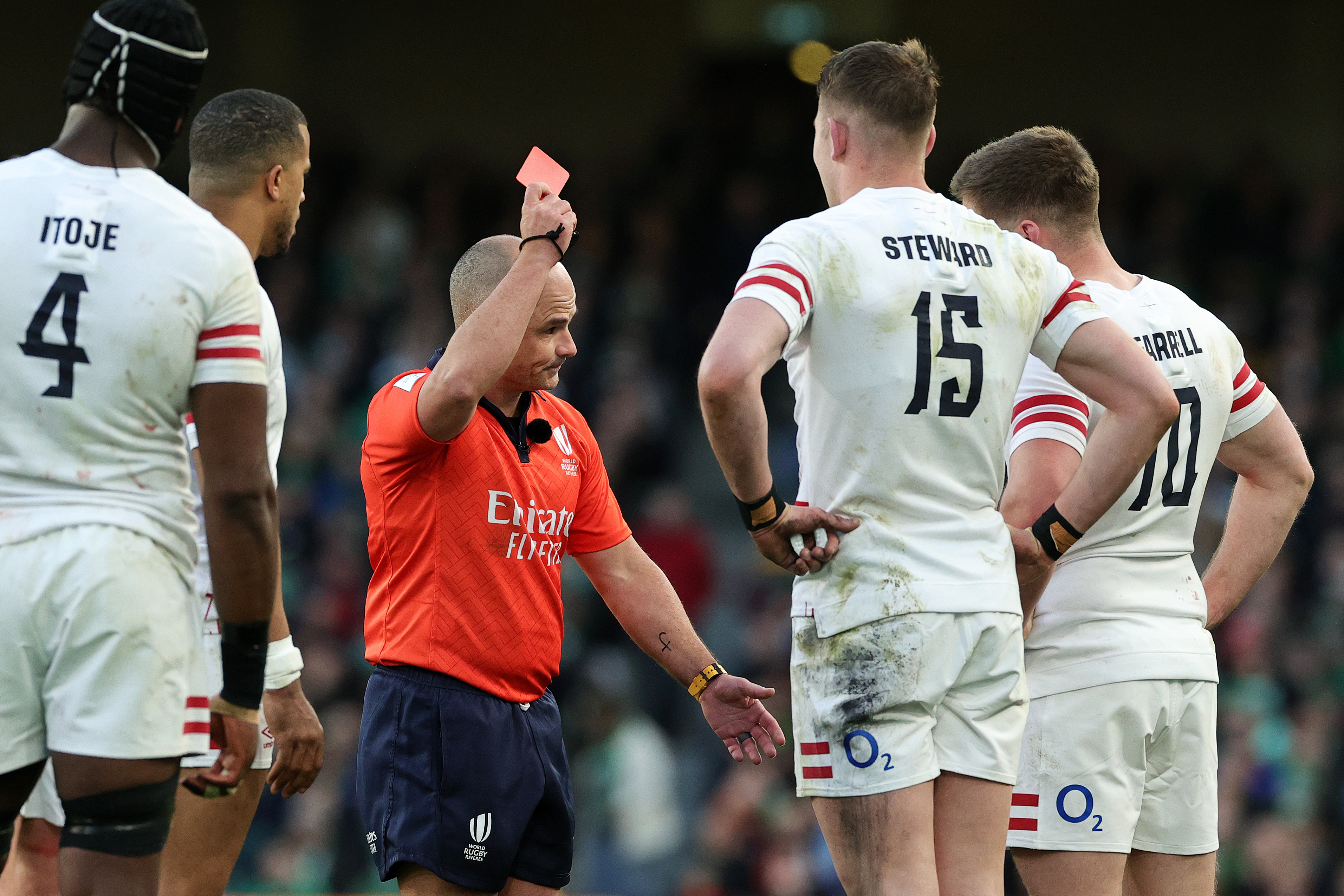LAYING DOWN THE LAW
URC head of referees Tappe Henning wants to simplify rugby’s laws for officials

United Rugby Championship head of referees Tappe Henning has underlined how important it is for match officials to have a ‘feel’ for the game as they navigate its complex laws.
In the past few months, two of rugby’s most acclaimed referees – Wayne Barnes and Jaco Peyper – have retired. Their absence leaves a void in one of the most complex jobs in world sport.
There are few if any sports where the influence of the official is greater than in rugby. Few important games are played without a detailed dissection of the performance of the referee and the rest of his team of assistants.
It has led to an alarming increase in online abuse via social media, to the point where one official, Tom Foley, retired last December. Barnes voiced his criticism.

Referee Wayne Barnes upgrades Sam Cane of New Zealand’s yellow card to a red card during the Rugby World Cup Final against South Africa at Stade de France in Paris on 28 October 2023. (Photo: Dan Mullan / Getty Images)
“There is so much wrong with society, wrong with our game and wrong with so-called fans, if Tom Foley, who’s significantly developed and improved the role of a TMO (television match official), steps down from international rugby.
“Rugby has lost one of its best officials. People need a hard look at themselves,” Barnes wrote on X.
Complex game
Rugby is governed by 21 laws with multiple sub-clauses. The entire law book runs to 160 pages with illustrations, and most of these actions outlined in the text take place at high speed in real life.
No wonder it’s a thankless task and a job that is virtually impossible to perform with 100% accuracy, simply because it is so complex.
Take Law 14 – the tackle – for example. In the latest version of World Rugby’s lawbook, it has 11 clauses and 25 sub-clauses. Almost immediately after a tackle occurs, a ruck (Law 15) is formed, which comes with another 19 clauses and multiple sub-clauses.
A referee has to compute all these factors in an instant, mentally scan the law book, and decide what sanction, if any, to apply. Often multiple infringements occur almost simultaneously. It’s a fraught job at the best of times.
Throw in the additional burden of a multitude of camera angles highlighting the most marginal of infractions, where refereeing mistakes – real or perceived – are amplified and vilified on social media, and it’s no wonder there is real concern for the mental well-being of officials.
Simplify
United Rugby Championship (URC) head of referees Tappe Henning, in his feedback sessions with officials, tries to simplify how referees approach this complex task practically.
They are not androids who never make mistakes or apply every single clause of every single law at every action. We might never have a game if that’s the case.
“What people need to understand is that the law is not the most important aspect to the referee,” Henning told Daily Maverick.
“It’s important for the official to know the laws. But when the game is being played, the law is not as important as the game.
“What I mean is that the law only becomes important when the referee blows his whistle because the decision that follows must be aligned with the law.
“We learn the law, we interpret the law and apply the law to the agreed expectations. The interpretation and the application are needed, but not to the letter of the law, and that’s important.”

Freddie Steward of England receives a red card from referee Jaco Peyper during the Six Nations match against Ireland at Aviva Stadium in Dublin, Ireland on 18 March 2023. (Photo: David Rogers / Getty Images)
That could easily be interpreted as turning a blind eye to an infringement, but that’s not the case – laws still have to be applied. But setting boundaries and using common sense are essential traits to good officialdom and better games.
Some of the best games of rugby have happened when referees have applied sense as much as the law. Some call it “allowing the game to flow”, but perhaps letting the game breathe is a more accurate interpretation.
“Ultimately, we strive to referee the game against the fairness of what’s happening between the two teams,” Henning said.
“If something happens that seems unfair, then we need to ask; is it within the law? If not, then the referee will make the appropriate decision.
“So, we probably need to educate the public a bit about that process of our decision-making, but it always comes back to what’s wrong versus what matters.”
Hot and cold rucks
Henning uses the simple example of someone straying offside, but having no material impact on the game. That’s easily picked up by cameras and fans get angry, but the referee has to assess whether it impacted on the play.
If there is no influence, the ref can ask the player to retreat and no harm is done. By the letter of the law, that should be a penalty. But if every infringement of that kind was blown, the game would be a staccato mess.
It’s the same at rucks. You will often hear referees shout at a player to “leave it”, or “roll away”, and at other times there will be no warning – just a shrill blast of the whistle and a penalty.
“The reason for this is that we try to differentiate between what we call ‘hot rucks’ versus ‘cold rucks’,” Henning explained.
“A hot ruck is where the tackle takes place, the players go to ground, the ball is placed and immediately available, the scrumhalf comes in and there is momentum with the attacking team. They want to keep that momentum going, but then a defender puts an arm in to slow the ball.
“In that case, the referee blows immediately because momentum has been stopped and the infringement was always illegal.
“A cold ruck starts legally in the way that the tackle was executed, but a player falls on the wrong side. The player must be allowed the opportunity to roll away. The ref can judge if there is momentum or not in that situation.
“The ref then has the opportunity to talk the player off, and if they don’t, the ref will either award an advantage or blow for a penalty. When a legal act was performed initially but could develop into an illegal situation subsequently.”
These interpretations are crucial in keeping the game flowing, and while they might still lead to some grey areas, officials are at least operating with a clear understanding of what they’re looking for.
Abuse
Referees are heavily scrutinised in rugby – from coaches and fans to television pundits and media – and it’s led to a rise in abuse.
That is something Henning and his department are concerned about and something they’re working to address, although managing social media is not within their control.
“With all the technology available, it’s easy to find what’s wrong in post-match analysis with arrows and lines and things across the field to prove if someone was offsides, for instance,” Henning said.
“It takes a special individual to be a referee. It needs an individual who has the confidence to make decisions and also realise that not all their decisions are going to be correct.
“They must know that there will be criticism over certain decisions, but that’s okay. They are trained and supported by rugby bodies while they also have to develop the ability to cope.
“Criticism will happen and we’re not immune, but what we’re seeing in social media can be too much now.”
One last example of how external factors also play a role; consider what information the referee is given.
“We work with over five territories in different countries and with eight different broadcasters,” Henning explains. “Each one has got their way of doing things, in different stadiums with different systems that are compatible with the technology the broadcasters use for their broadcast.
“It can lead to some issues such as not seeing what we call the ‘money shot’ on the big screen. But we’re working on unifying and ensuring we have the same systems and protocols in every territory.” DM



















Comments - Please login in order to comment.